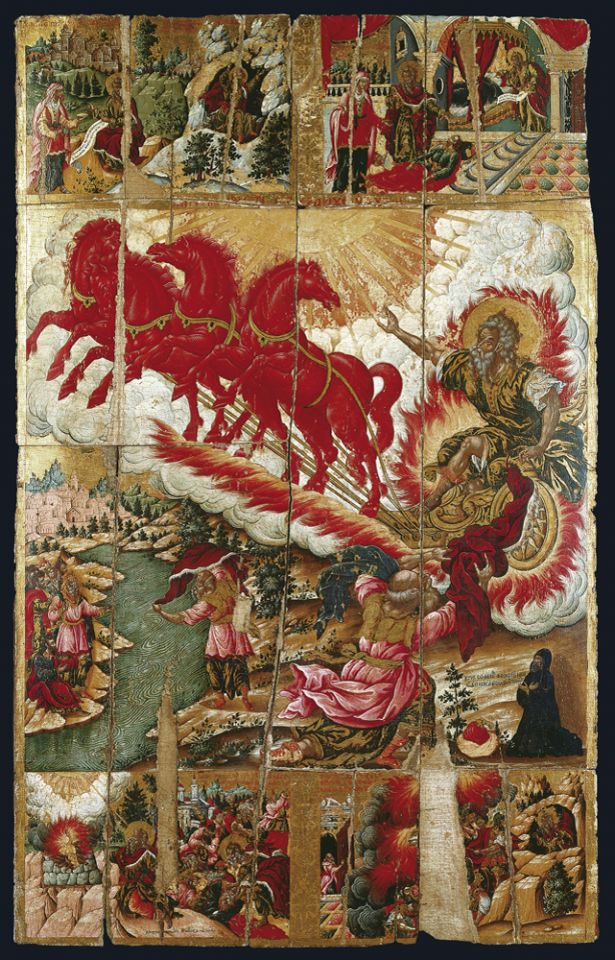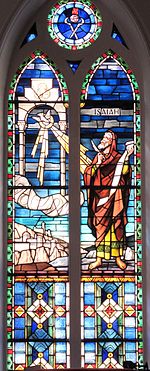.jpg)
| Prophet Isaiah; illustration from a Bible card published by the Providence Lithograph Company (c. 1904) | |
| Prophet | |
|---|---|
| Born | 8th Century B.C. Judah (?) |
| Died | 7th Century B.C. |
| Honored in | Judaism Roman Catholic Church Eastern Catholic Churches Eastern Orthodox Church Lutheranism Islam[1] Armenian Apostolic Church |
| Feast | May 9 [2] |
Isaiah(
Isaiah is not mentioned anywhere outside of the Bible[7]. It is stated in the first verse of the Book of Isaiah that he prophesied during the reigns of Uzziah (or Azariah), Jotham, Ahaz, and Hezekiah, the kings of Judah (Isaiah 1:1). Uzziah reigned fifty-two years in the middle of the 8th century BC, and Isaiah must have begun his career a few years before Uzziah's death, probably in the 740s BC. Isaiah lived until the fourteenth year of Hezekiah (who died 698 BC), and may have been contemporary for some years withManasseh. Thus Isaiah may have prophesied for as long as sixty-four years.
In early youth, Isaiah may have been moved by the invasion of Israel by the Assyrianmonarch Tiglath-Pileser III (2 Kings 15:19); and again, twenty years later, when he had already entered on his office, by the invasion of Tiglath-Pileser and his career of conquest. Ahaz, king of Judah, at this crisis refused to co-operate with the kings of Israel and Syria in opposition to the Assyrians, and was on that account attacked and defeated by Rezin of Damascus and Pekah of Israel (2 Kings 16:5; 2 Chronicles 28:5–6). Ahaz, thus humbled, sided with Assyria, and sought the aid of Tiglath-Pileser against Israel and Syria. The consequence was that Rezin and Pekah were conquered and many of the people carried captive to Assyria (2 Kings 15:29, 16:9; 1 Chronicles 5:26).
Soon after this Shalmaneser V determined wholly to subdue the kingdom of Israel, Samaria was taken and destroyed (722 BC). So long as Ahaz reigned, the kingdom of Judah was unmolested by the Assyrian power; but on his accession to the throne, Hezekiah, who was encouraged to rebel "against the king of Assyria" (2 Kings 18:7), entered into an alliance with the king of Egypt(Isaiah 30:2–4). This led the king of Assyria to threaten the king of Judah, and at length to invade the land.Sennacherib (701 BC) led a powerful army into Judah. Hezekiah was reduced to despair, and submitted to the Assyrians (2 Kings 18:14–16). But after a brief interval war broke out again, and again Sennacherib led an army into Judah, one detachment of which threatened Jerusalem (Isaiah 36:2–22; 37:8). Isaiah on that occasion encouraged Hezekiah to resist the Assyrians (37:1–7), whereupon Sennacherib sent a threatening letter to Hezekiah, which he "spread before the LORD" (37:14).
| “ | Then Isaiah the son of Amoz sent to Hezekiah, saying, Thus saith the LORD God of Israel, That which thou hast prayed to me against Sennacherib king of Assyria I have heard.
This is the word that the LORD hath spoken concerning him; The virgin the daughter of Zion hath despised thee, and laughed thee to scorn; the daughter of Jerusalem hath shaken her head at thee.
Whom hast thou reproached and blasphemed? and against whom hast thou exalted thy voice, and lifted up thine eyes on high? even against the Holy One of Israel.
| ” |
According to the account in Kings (and its derivative account in Chronicles) the judgment of God now fell on the Assyrian army and wiped out 180,000 of its men. "Like Xerxes in Greece, Sennacherib never recovered from the shock of the disaster in Judah. He made no more expeditions against either southern Palestine or Egypt."[9]
The remaining years of Hezekiah's reign were peaceful (2 Chr 32:23–29). Isaiah probably lived to its close, and possibly into the reign of Manasseh, but the time and manner of his death are not specified in either the Bible or recorded history. There is a tradition (reported in both the Martyrdom of Isaiah and the Lives of the Prophets) that he suffered martyrdom by Manasseh due to pagan reaction.
In Christianity
Gregory of Nyssa (c. 335–395), believed that the Prophet Esaias (Isaiah) "knew more perfectly than all others the mystery of the religion of the Gospel." Jerome (c. 342–420) also lauds the Prophet Esias, saying, "He was more of an Evangelist than a Prophet, because he described all of the Mysteries of the Church of Christ so vividly that you would assume he was not prophesying about the future, but rather was composing a history of past events."[10]
In Islam
Although Isaiah is not mentioned by name in the Qur'an or in the authenticated sayings of Prophet Muhammed, some Muslim sources have accepted him as a prophet.[11] Some Muslim scholars, such as Ibn Kathir and Kisa'i, reproduced Jewish traditions, transmitted through early Jewish converts to Islam, regarding Isaiah. Such Old Testament stories, which are not confirmed by the Quran or prophetic hadeeth, are referred to as Isra'iliyyah, and are not considered strong enough to be used as evidence in Islamic law. Isaiah is mentioned as a prophet in Ibn kathir's Stories of the Prophets and the modern writersMuhammad Asad and Abdullah Yusuf Ali[12] accepted Isaiah as a true Hebrew prophet, who preached to the Israelites following the death of King David. Isaiah is well known inMuslim exegesis and literature, notably for his predictions of the coming of Jesus andMuhammad.[13] Isaiah's narrative in Muslim literature can roughly be divided into three sections. The first part establishes Isaiah as a prophet of Israel during the reign ofHezekiah; the second part focuses on Isaiah's actions during the siege of Jerusalem bySennacherib; and the third part is primarily focused upon Isaiah warning the people of coming doom.[14]
Muslim exegesis preserves a tradition, which parallels that of the Hebrew Bible, which states that Hezekiah was the king that ruled over Jerusalem during Isaiah's time. Hezekiah obeyed and gave an ear to what Isaiah advised him but, nonetheless, this was a turbulent time for Israel.[15] Tradition, however, maintains that Hezekiah was a righteous man and that the turbulence increased after Hezekiah's death. After the death of the king, Isaiah told the people to not forsake God and he warned Israel that the people must cease from their persistent sin and acts of disobedience. Muslim tradition maintains that the unrighteous people of Israel were angered and sought to kill Isaiah.[15] In a death which resembles that attributed to Isaiah in Lives of the Prophets, Muslim exegesis recounts that Isaiah was martyred by Israelites by being sawed in half.[15]
Rabbinic literature
Main article: Isaiah in Rabbinic Literature
According to the Rabbinic literature, Isaiah was a descendant of the imperial house ofJudah and Tamar (Sotah 10b). He was the son of Amoz (not to be confused with ProphetAmos), who was the brother of King Amaziah of Juda. (Talmud tractate Megillah 15a).[16]
References
- ^ Historical Dictionary of Prophets in Islam and Judaism, B. M. Wheeler, Appendix II
- ^ Wells, John C. (1990). Longman pronunciation dictionary. Harlow, England: Longman. p. 378. ISBN 0-582-05383-8.
- ^ New Bible Dictionary, Second Edition, Tyndale Press, Wheaton, IL, USA 1987.
- ^ The Scofield Study Bible III, NKJV, Oxford University Press
- ^ De Jong, Matthijs J., Isaiah Among The Ancient Near Eastern Prophets: A Comparative Study of the Earliest Stages of the Isaiah Tradition and the Neo-Assyrian Prophecies, BRILL, 2007, p. 13-17 [1]
- ^ JPS Hebrew English Tanakh, Jewish Publication Society, 2000
- ^ Hugh Williamson Ed., Interpreting Isaiah: Issues and Approaches (288 pp. Nottingham: Apollos, 2009)
- ^ A Brief Introduction to the Old Testament, Michael D. Coogan, Oxford University Press, 2009, Page 273.
- ^ Sayce, Archibald Henry. The ancient empires of the East. Macmillan, 1884, p. 134.
- ^ The Lives of the Holy Prophets, Holy Apostles Convent, ISBN 0-944359-12-4, page 101.
- ^ Encyclopedia of Islam
- ^ The Holy Qur'an: Text, Translation and Commentary, Note. 2173 to 17:4: "The Book is the revelation given to the Children of Israel. Here it seems to refer to the burning words of Prophets like Isaiah. For example, see Isaiah, chap, 24. or Isaiah 5:20-30, or Isaiah 3:16-26."
- ^ Encyclopedia of Islam, Shaya, Online Web.
- ^ Tabari, History of the Prophets and Kings, i, 638-45
- ^ a b c Stories of the Prophets, Ibn Kathir, Isaiah bin Amoz
- ^ Isaiah at Jewish Encyclopedia
- Further reading
- Church, Brooke Peters (1953). The Private Lives of the Prophets and the Times in Which They Lived. New York: Rinehart.
- Cohon, Beryl D. (1939). The Prophets: Their Personalities and Teachings. New York: Scribner.
- Herbert, Arthur Sumner (1975). The book of the prophet Isaiah : Commentary. Cambridge: Cambridge University Press. ISBN 0-521-08624-8.
- Herbert, Arthur Sumner (1975). The book of the Prophet Isaiah, chapters 40-66. Cambridge: Cambridge University Press. ISBN 0-521-20721-5.
- Kraeling, Emil G. (1969). The Prophets. Chicago: Rand McNally.
- Miscall, Peter D. (1993). Isaiah. Sheffield, England: JSOT Press. ISBN 1-85075-435-7.
- Quinn-Miscall, Peter D. (2001). Reading Isaiah : poetry and vision. Louisville: Westminster Press. ISBN 0-664-22369-9.
- Phillips, J.B. (1963). Four Prophets, Amos, Hosea, First Isaiah, Micha: A Modern Translation from the Hebrew. New York: Macmillan.
- Sawyer, John F.A. (1996). The fifth gospel : Isaiah in the history of Christianity. Cambridge: Cambridge University Press. ISBN 0-521-44007-6.
- Scott, R.B.Y. (1968). The Relevance of the Prophets. Macmillan: London.
- Smith, J.M. Powis (1941). The Prophets and Their Times. Chicago: University of Chicago


